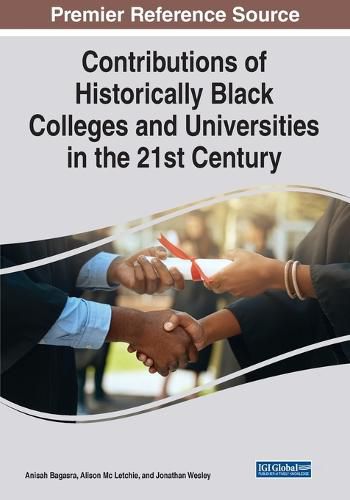Readings Newsletter
Become a Readings Member to make your shopping experience even easier.
Sign in or sign up for free!
You’re not far away from qualifying for FREE standard shipping within Australia
You’ve qualified for FREE standard shipping within Australia
The cart is loading…






This title is printed to order. This book may have been self-published. If so, we cannot guarantee the quality of the content. In the main most books will have gone through the editing process however some may not. We therefore suggest that you be aware of this before ordering this book. If in doubt check either the author or publisher’s details as we are unable to accept any returns unless they are faulty. Please contact us if you have any questions.
Despite the declaration that we are living in a post-racial America, multiple recent events in which Black lives were prematurely ended have sparked a racial reckoning within the United States. Historically Black Colleges and Universities (HBCUs) are institutions with a long history of addressing racial disparities and injustices whose relevance is being recognized in light of these recent events. It is essential to give voice to those who represent the ongoing challenges, aspirations, and impact of HBCUs in the 21st century in upholding their collective mission to educate students of color who were historically excluded from institutions of higher education.
Contributions of Historically Black Colleges and Universities in the 21st Century focuses on the role of HBCUs in contemporary American society as diverse and inclusive environments that continue to positively impact historically excluded students. The voices of faculty, students, and administration are included to highlight the innovations and contributions of HBCUs in the areas of scholarship, teaching, and service. Covering topics such as BlaQ Lives Matter, community activism, and self-advocacy, this premier reference source is a valuable resource for sociologists, higher education administration, graduate programs, faculty and administrators at HBCUs, students and educators of higher education, libraries, government officials, activists, non-profit organizations, researchers, and academicians.
$9.00 standard shipping within Australia
FREE standard shipping within Australia for orders over $100.00
Express & International shipping calculated at checkout
This title is printed to order. This book may have been self-published. If so, we cannot guarantee the quality of the content. In the main most books will have gone through the editing process however some may not. We therefore suggest that you be aware of this before ordering this book. If in doubt check either the author or publisher’s details as we are unable to accept any returns unless they are faulty. Please contact us if you have any questions.
Despite the declaration that we are living in a post-racial America, multiple recent events in which Black lives were prematurely ended have sparked a racial reckoning within the United States. Historically Black Colleges and Universities (HBCUs) are institutions with a long history of addressing racial disparities and injustices whose relevance is being recognized in light of these recent events. It is essential to give voice to those who represent the ongoing challenges, aspirations, and impact of HBCUs in the 21st century in upholding their collective mission to educate students of color who were historically excluded from institutions of higher education.
Contributions of Historically Black Colleges and Universities in the 21st Century focuses on the role of HBCUs in contemporary American society as diverse and inclusive environments that continue to positively impact historically excluded students. The voices of faculty, students, and administration are included to highlight the innovations and contributions of HBCUs in the areas of scholarship, teaching, and service. Covering topics such as BlaQ Lives Matter, community activism, and self-advocacy, this premier reference source is a valuable resource for sociologists, higher education administration, graduate programs, faculty and administrators at HBCUs, students and educators of higher education, libraries, government officials, activists, non-profit organizations, researchers, and academicians.